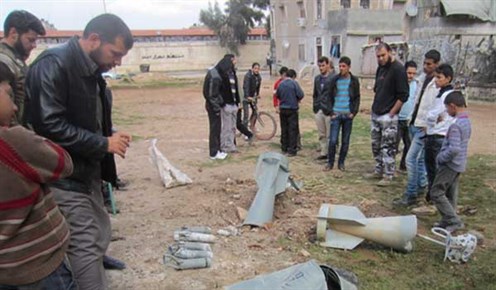26 September 2014
Cluster Munition Coalition Urges No Use of Cluster Munitions by US and Others in Syria and Iraq

Cluster bombs launched by Syrian government forces against a housing estate in Aleppo, Syria, on 1 March 2013, unexploded submunitions from a cluster bomb can be seen center left. ©Amnesty International
The Cluster Munition Coalition (CMC) urges all states and specifically the 114 countries that have joined the Convention on Cluster Munitions to help ensure that these weapons are not used by the United States and coalition partners in the offensive launched this week against non-state armed groups in Syria, and similar strikes in Iraq. Cluster munitions were banned in 2008 due to the indiscriminate killing of civilians they have caused at the time of their use and long afterwards.
“Cluster bomb use by the Syrian government over the past two years has already resulted in terrible human suffering and destruction. Under no circumstances should the coalition forces now striking targets in Syria and Iraq add to this deadly toll,” said Cluster Munition Coalition Director Sarah Blakemore. “The Cluster Munition Coalition urges all States Parties to abide by their legal and moral obligation to prevent the use of cluster munitions in this military operation, and we urge all states still outside the convention to join the ban and end these weapons’ deadly legacy,” she added.
Neither the US nor Syria has joined the 2008 Convention on Cluster Munitions. Nor have coalition partners Bahrain, Jordan, Saudi Arabia, and the United Arab Emirates, which all stockpile cluster munitions according to the Cluster Munition Monitor, the research arm of the Cluster Munition Coalition. Iraq is a State Party to the treaty.
More than 150 countries, including the United States, have condemned the use of cluster munitions in the context of ongoing Syrian government use. In October 2012, the then-Permanent Representative of the US to the UN, Ambassador Susan Rice, said that cluster bomb use by Syrian government forces was an example of "atrocities" by the Syrian regime.
States Parties to the Convention on Cluster Munitions unanimously condemned any use of cluster munitions, anywhere, by anyone, in a 5 September Final Report from the annual Convention meeting in San José, Costa Rica.
Under Article 21 of the Convention on Cluster Munitions, all States Parties have a legal obligation to discourage non-signatories from using cluster munitions. The Convention on Cluster Munitions comprehensively prohibits the use, production, transfer, and stockpiling of cluster munitions. It also requires clearance of cluster munition remnants within 10 years and immediate access to assistance for victims of the weapons.
Use of cluster munitions by governments has been curtailed since the establishment of the 2008 Convention on Cluster Munitions. In the context of an increasingly powerful global stigma against the use of cluster munitions, use has been limited to a small number of instances, with the exception of extensive use since July 2012 by Syria, which has demonstrated a notorious disregard for international humanitarian law. There has also been recent credible evidence of cluster munition use by “Islamic State” forces in northern Syria. Such use by non-state armed groups emphasizes the urgent need for Syria and all nations that have not yet done so to join the ban on cluster munitions and destroy their stockpiles.
The United States used cluster munitions in Iraq in 1991 and 2003, leaving a deadly legacy of contamination that continues to claim civilian lives today. Since the Syrian conflict began in 2012, there have been more than 2,000 casualties from cluster munition strikes and remnants, the overwhelming majority civilians. The Cluster Munition Coalition called on the United States and its allies to refrain from any use of cluster munitions in a potential air campaign against Syria in 2013.


